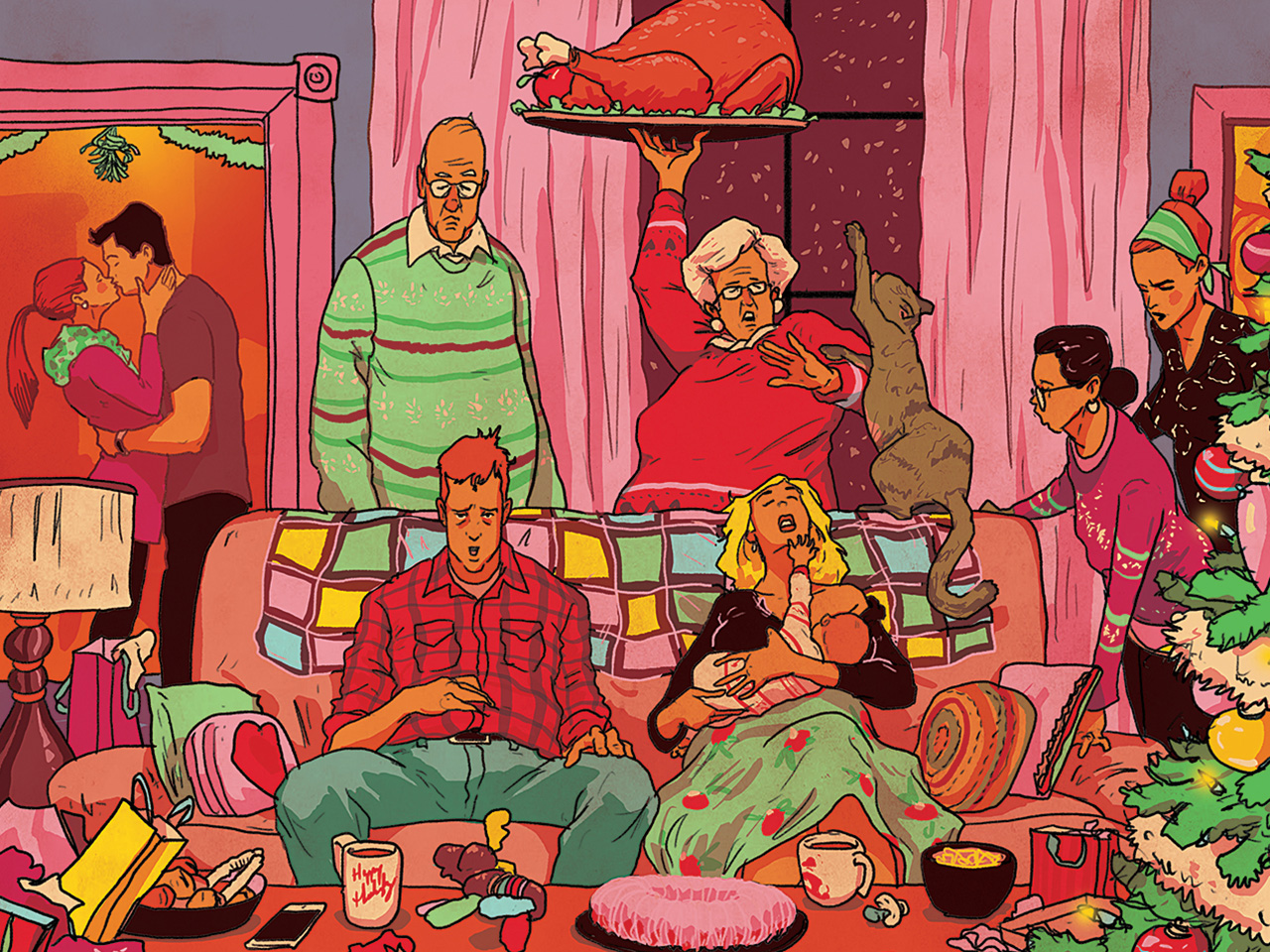
Follow the 80/20 rule
A grandmother wearing a santa hat and her grandson are celebrating Christmas morning together. The elderly woman is sitting on the floor with the little boy and holding him in a tight embrace as they play. A Christmas tree can be seen in the background and toys scattered around the floor 5 ways to set boundaries with family over the holidaysAs a compromise, McGinn advises parents of young kids to adopt the 80/20 rule. “Try to stick to your kids’ routine 80 percent of the time, and then if the nap is missed or their bedtime is later 20 percent of the time, it shouldn’t be a huge issue,” she says.
That might mean having a policy that you only let your schedule slide for special occasions—and not for too many days in a row. “If grandparents are visiting and you have a great big family gathering, you can allow your child to stay up late,” suggests Roberts. “But if it’s the next day and the grandparents want the child to stay up late again, then you can put your foot down.”
If your kid still naps during the day, you might focus on getting in a solid daytime sleep when you know bedtime will be later. For a baby on a two- or three-nap schedule, the first nap of the day is the one to prioritize, says Janey Reilly, the CEO of WeeSleep, a Toronto-based sleep consulting company. “The morning nap is usually the longest and strongest nap of the day, so if they’ve had a good start to the day, they’re more apt to be able to handle a nap on the go later, or bedtime being a little bit later.” That might mean doing the first nap at home and then driving to the party around the time of the second nap, so your baby or toddler can sleep in the car on the way.
Or it might be best to arrive early and set up a Pack ’n Play or travel crib in another room for naptime. Try to keep their sleep habits as similar to home as possible: a familiar travel crib, a sleep sack, a beloved stuffed animal (if they’re old enough to have a stuffie in the crib) and, most important, a white noise machine to drown out any party sounds from down the hall. A dark room that’s far from the festivities is ideal. (A large closet with the door cracked open can be a great option.)
If you’ve already sleep trained your baby, don’t nurse them down or rock them to sleep on vacation or while staying somewhere new. If they fall asleep independently at home, they should be able to do so at a different house too, provided they have a quiet room and a few extra minutes of wind-down time. (And yes, that might mean letting them cry in their crib for five minutes while you sit in the living room, enduring withering looks from Grandma, who’s itching to go scoop up that baby.) If you do revert to old habits, like nursing or rocking the baby to sleep, you might have to spend a few nights re-sleep training your child when you return from your trip, but don’t worry about it too much. (It’s quite common, especially if there’s been a time-zone change during your travels.)
Enlist help
If there’s no chance your baby or toddler will nap alone in an unfamiliar bedroom, you can go to Plan B: Try a stroller walk or carrier nap instead. Sometimes leaving a bustling, boisterous house during the holidays and getting a little fresh air can be therapeutic for both you and the baby. If nosey Great Aunt Nancy has been chiming in with opinions on your parenting, ask her to help out. Maybe she’d love to take the baby on a long stroller nap around the neighbourhood, weather-permitting.
Take a breather
Remember that even little kids who don’t nap anymore can benefit from a block of midday downtime during or before a big event. “Kids under six often get overstimulated, and they don’t know it,” says Jennifer Kolari, a child and family therapist. “There’s a lot going on, and they get anxious,” she says. The chaos and excitement of big gatherings and multiple present-opening sessions can leave kids cruising on adrenaline and sugar highs, and then crashing at the end of the day. Finding some time to retreat to a room and read for a little bit, or going for a walk with just your immediate family can help them regroup and stay regulated later.
The art of the car seat transfer
Some kids can handle being put down for bedtime in a travel crib and then, at the end of the night, their parents quietly transfer them to the car seat for the drive home without waking them, says McGinn. (But don’t let your baby sleep in the car seat after you get home, due to the risk of positional asphyxiation. Always move them to their cribs.) To increase your odds of success, change your little one into pyjamas and a fresh diaper before you put them down in the travel crib, so you don’t have to wake them for a change later. This technique is much easier with babies who are still in a detachable bucket seat that can be brought inside the house during the transfers. Sadly, it gets much trickier with a convertible car seat.
Do what works
Sometimes the answer is to just leave early. Sarah Langridge, from Orangeville, Ont., says she did that for years. “I have always had a strict bedtime schedule, and we would be home by seven. My kids craved routine, and life was torture if we were off by even half an hour,” she says. Missing bedtime always ended in tantrums, and it would even make bedtime more difficult the next night.
Others just say no. There’s zero shame in taking a year or two off from big family parties or deciding you can only do one key gathering. Or you can offer to host this year, so your kids can sleep upstairs in their own rooms while the adults stay up.
“At the end of the day, there’s no right or wrong,” says McGinn. “It’s what works for each family.”
Lindsay Tucker, a mother of two in Aurora, Ont., came up with another solution. She found that trying to get together with extended family during the dinner hour was just too stressful, so they switched to brunches instead. Now, all the grandparents, parents and kids meet up to play in a park or go for a walk, then spend the afternoon grazing, chatting and hanging out. “It’s been amazing,” she says. “The kids are fresh and happy, and we’ve found my brother and cousins [who are also parents] aren’t as tired either. I feel like we’ve connected more deeply with my family.”
How to have the conversation
To set boundaries around your sleep schedule without hurting any feelings, let your hosts know your limitations right when you accept the invitation. If you’d prefer to leave by 7:30 p.m., be upfront about it. (It’s often easier for your partner to take charge of initiating this conversation with their own family.) And then in the moment, soften the impact by sharing what you appreciate and empathizing with the other person’s point of view before reaffirming that you have to go.
For example, if you’re talking to your mother about leaving before dessert, you might say something like, “You’ve put so much into this, and it’s such a beautiful dinner. You have no idea how much we want to be able to stay here for the whole evening—but we need to go,’” says Kolari. If you start with where the other person is coming from, they’re more likely to stay calm and less likely to feel offended. If it doesn’t smooth things over, stand firm.
“I often just say, ‘You know what? We’ve worked really hard on sleep, and it’s something that is really important to us. I know my kids might not be tired now, but trust me, in half an hour, they’re going to be,’” says Reilly.
It may help to know that you won’t be having these conversations forever. My sleep-sensitive little guy turned four this year, and now we can let him stay up a bit later on occasion. His one-year-old sister, on the other hand, isn’t so flexible. But this time, I know it’s a phase, and I’m more confident in my choices as a mom.

 KSA
KSA Bahrain
Bahrain UAE
UAE Qatar
Qatar Jordan
Jordan Egypt
Egypt Turkey
Turkey




(0) Comments